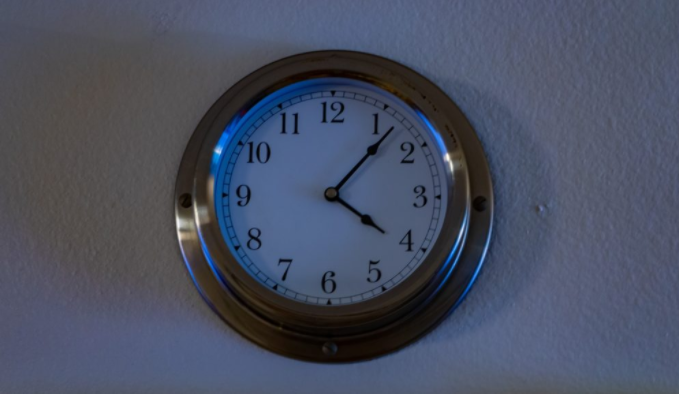 Clock reads 4:07 in the morning demonstrating the extremes some students have to wake up in order to get in their work. Photo by Timothy Roe.
Clock reads 4:07 in the morning demonstrating the extremes some students have to wake up in order to get in their work. Photo by Timothy Roe.
By Kayla Hoang, Staff Writer
It’s a known fact that many teenagers are night owls, especially considering their work piles on as they move through school. However, factors like homework, extracurriculars and school starting before 8:30 a.m. all lead to them getting much less sleep than they should be.
Teachers stress how important getting your hours of sleep are, and students know that maintaining a social life is also extremely important. We’re all told by the same teachers and advisors that getting your rest is important, as well as spending time away from school. These are also the same people that assign us homework, tests and other educational expectations for us to pass the class. This doesn’t include other extracurriculars we have outside of school.
Studies have shown that eight to 10 hours of sleep is the crucial in order to properly function in the morning. Unfortunately, high school students are shown, on average, to get between five to seven hours on a school night.
Of course, time management is all too important when it comes to balancing your academic and social life. However, when it gets to the point when your hours of sleep start affecting your performance at school, then there’s a bigger issue at hand.
Our cognitive function depends on our ability to balance and maintain a routine to ensure that we get the nutrients and necessities we need (ex: three meals a day, 8-10 hours of sleep, etc.). Mary Cardaskon, a Brown University professor, revealed that sleep-deprived teens showed the same traits as patients with narcolepsy. Other studies found that the brain performs more poorly at school, due to shorter attention spans and weaker cognitive skills. Mental health issues also rise a bigger concern towards our youth, including depression and other types of risky behavior.
In order to gauge how much time students dedicate to school, extracurriculars and their sleeping habits, an online survey was taken which mostly consisted of responses from FVHS students.
According to the responses, 48.6% of students spend four to five hours on homework, and 25.7% spend between three and four hours. 88.5% of students have at least one extracurricular outside of school, and 54.2% of students get only five to six hours of sleep. In addition, over 20 percent of students receive four or less hours.
The need for us to take time to ourselves to refresh our mental stability and health is so commonly negated by the pressure to do well at school and succeed. Put it this way: We spend about six hours at school (excluding zero or seventh period). Many teenagers have at least one activity or extracurricular outside of their classes taking up, let’s say, an extra hour for that. According to the survey, almost half of the students spend about four to five hours on their homework. That’s already 11 to 12 hours spent on your academic life. We still need three meals a day, thus taking out another two hours of the day. Teenagers still have their fair share of socializing on their devices or with friends, so we can also throw in another hour or two because of that. Most of us are already looking at only five to seven hours of sleep, too little to properly function every day.
Sleep deprivation is an issue with today’s youth, but it’s constantly overlooked by the heavy weight of school, colleges and success overall. An early start to school is a common factor in getting too little sleep, and I’m sure there are many teachers who assign far too much homework for each student to handle.
There are plenty of methods to try and solve this epidemic. For example, a later start time and appropriate homework load, exams and tests. If the school system and our teachers were able to place a legitimate effort in examining our youth’s mental and behavioral health, then the topic of sleep deprivation in teenagers can be more adequately addressed.





